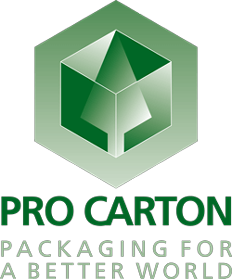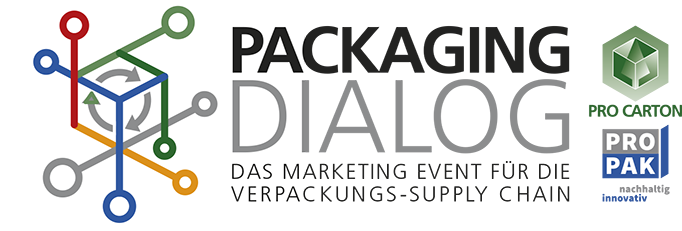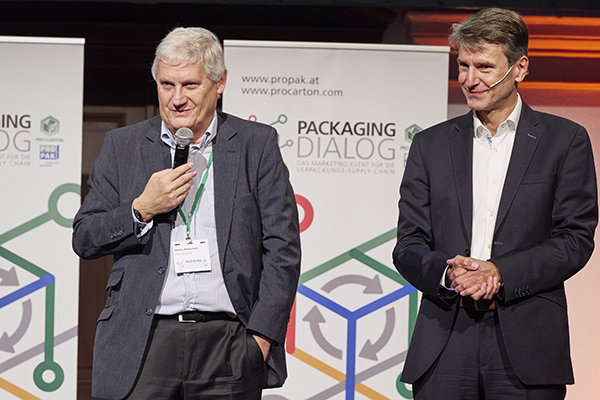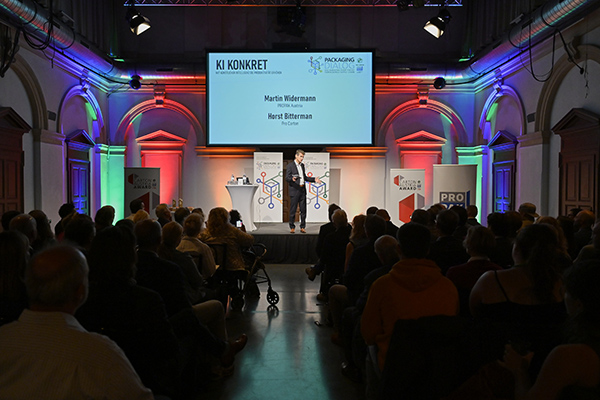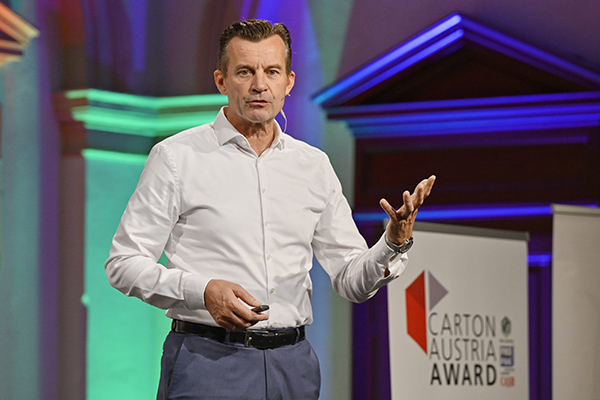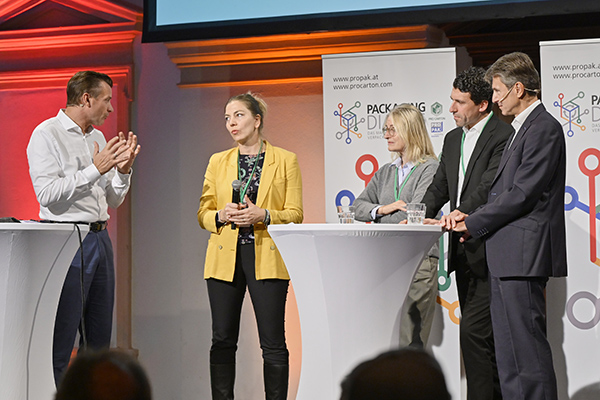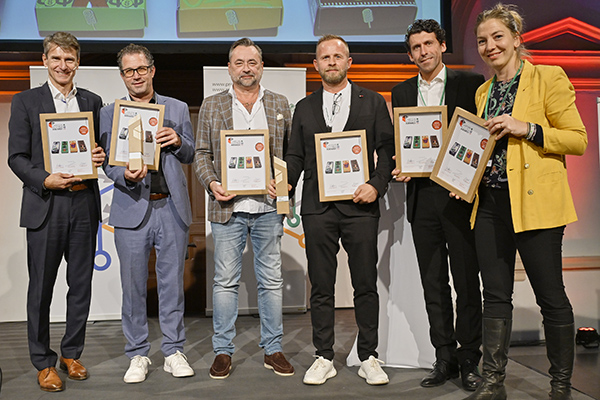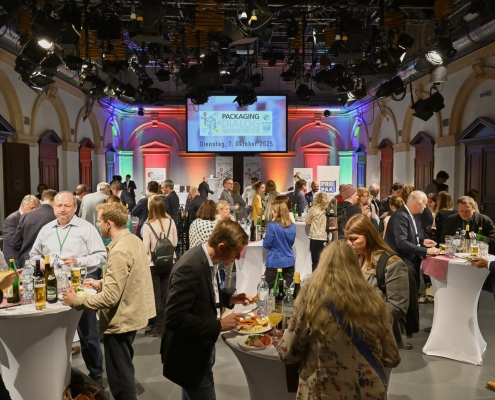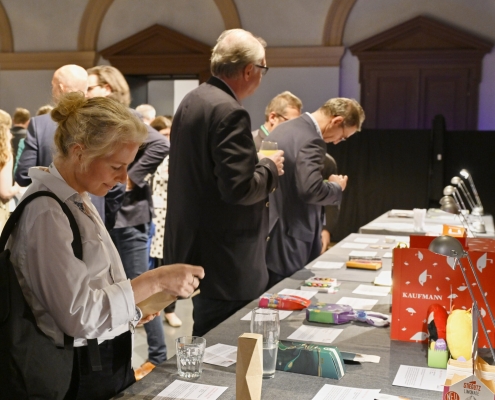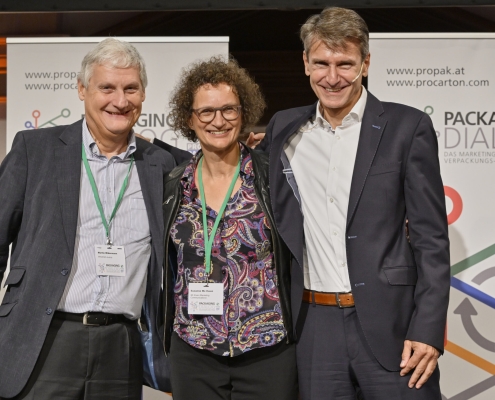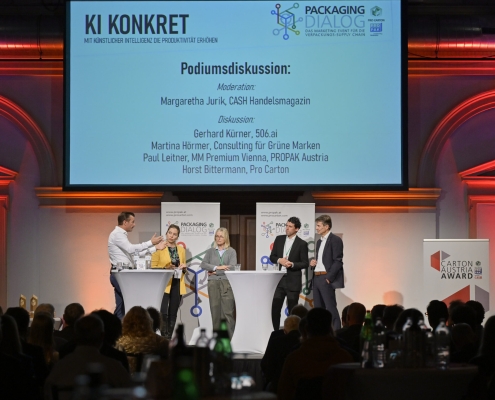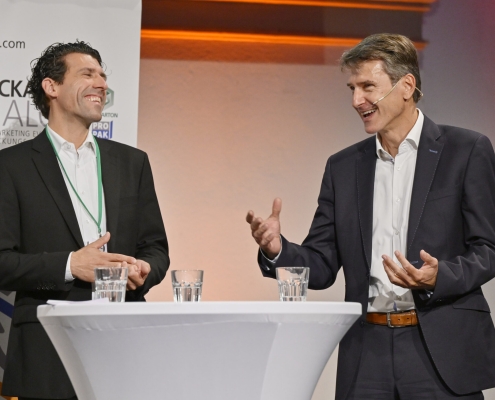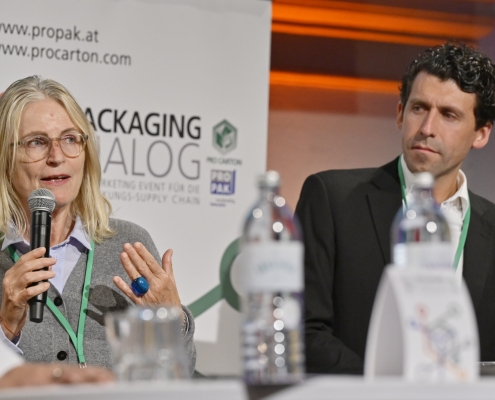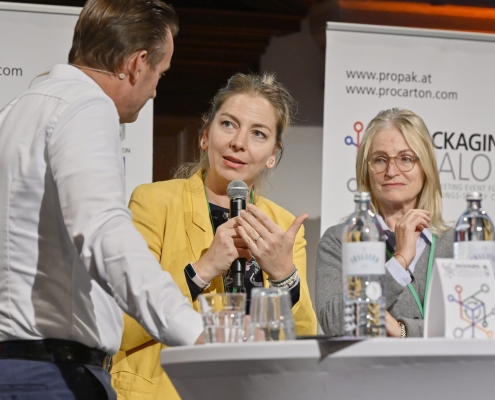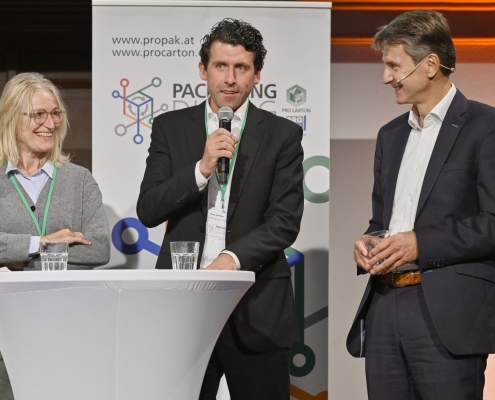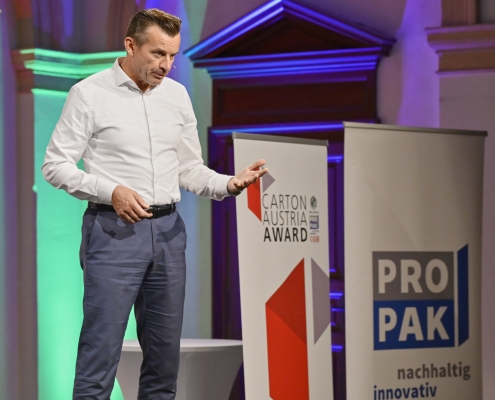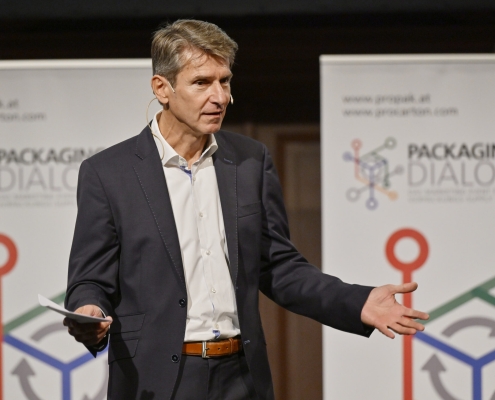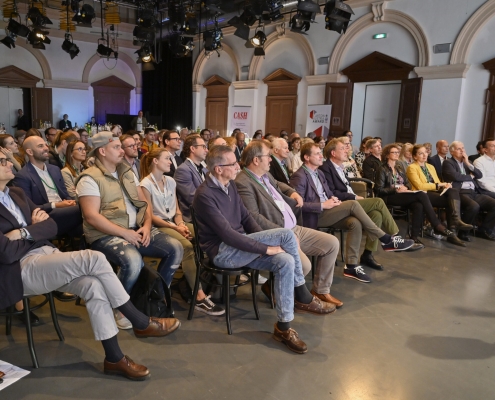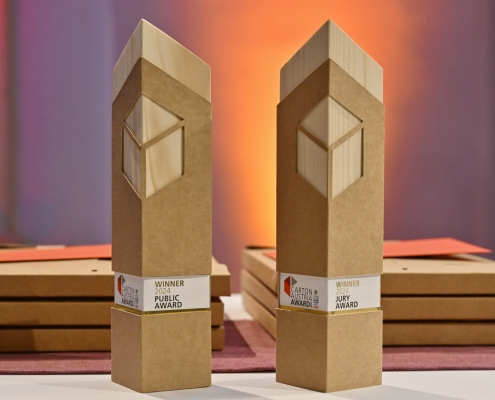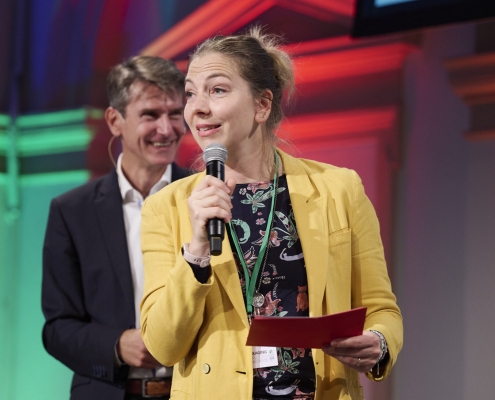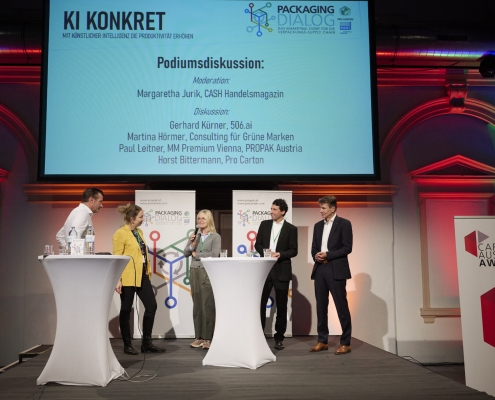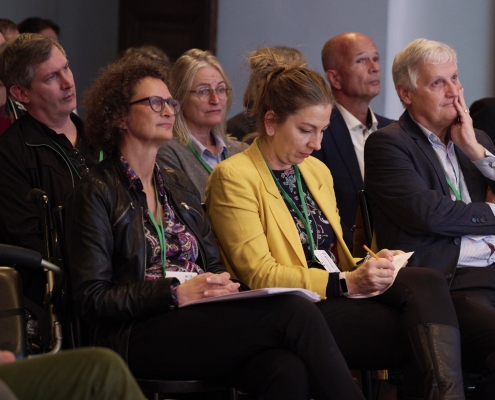This year, the Packaging Dialogue 2024 was dedicated to a topic that is of burning interest to everyone: Where and how should AI be used if you want to be at the forefront? Gerhard Kürner, founder and CEO of the AI consultancy 506.ai and profile columnist, used concrete examples to show in which areas artificial intelligence multiplies efficiency in everyday life. The crowning conclusion was the award ceremony for the Carton Austria Award 2024.
Horst Bittermann, Director General of Pro Carton, opened the evening together with Martin Widermann, Managing Director of PROPAK Austria.
Horst Bittermann then gave a brief overview of the carton and folding box industry. The difficulty of the situation is evident from European demand for carton: in 2022, market demand was 8 million tonnes of carton, in 2023 it was 25 percent less and in 2024 we see a double-digit increase again. The outlook is positive: 3 percent growth per year is forecast for the next five years from 2025. This forecast is above the current GDP, with which carton and folding box production is generally developing in parallel. GDP is also expected to recover due to low inflation and key interest rate cuts.
The outlook has also improved with regard to the EU. It has been possible to strengthen the position of fibre-based packaging in the work on the new EU Packaging Regulation (PPWR) and to establish possibilities for replacing plastic in some areas in the future. Another good sign is that the EU now has a Commissioner for Circular Economy, which gives hope for understanding for our industry, which has achieved an overall recycling rate of 82.5 percent. Since the Draghi report at the latest, the EU has generally become more industry-friendly.
In addition, Pro Carton has repositioned itself: CEPI Cartonboard was integrated into Pro Carton and moved into a shared office with the ECMA (European Carton Makers Association) in Brussels.
Beyond Limits – Artificial Intelligence in Business and Society
Gerhard Kürner, founder and CEO of 506.ai , Vice Chairman AI Upper Austria, profile columnist
In general, AI is an assistive system. According to a study by Goldman Sachs two years ago, almost all office work, legal work, architecture, social science, management, finance and even healthcare will be taken over by AI by a quarter to almost half. The least affected, however, are personal care, construction, repair, transport and general manual work.
In practice, this means that most creative work can be carried out much faster and often better with the support of AI. The financial company Klarna, for example, replaced two-thirds of its telephone customer service with AI, and this has led to a significant improvement: the number of second questions fell sharply, and there were no third questions at all! Klarna was able to save 25 percent on its marketing agency expenses with AI – and that despite a turnover of billions! It is therefore not surprising that, according to the Work Trend Index, applicants with AI experience will be preferred in the future, even over those who have experience in the respective field.
Technical development is extremely rapid. For example, just a year and a half ago it would have taken up to eight hours to imitate a voice. Half a year ago it was an hour, today it is a matter of a few minutes and very soon seconds. With simple prompts made up of a few words, you can now create not just images but entire films.
For $25 and two hours of webcam work, I can have my own avatar give lectures in any language. In a few months, you will be able to ask this avatar questions and it will be able to provide expert answers from clearly defined documents – for example, from the PROPAK website. ChatGPT can also already explain images, for example which key from a toolbox is needed for a certain task.
For industry, this means that the topic should be approached energetically but cautiously and that no major investments should be made that could be out of date tomorrow. There is no one golden solution. On the contrary: AI supports work that is relatively “unsexy”. For example, it can compare different contracts, explain legal texts, check whether project submissions are complete, write project texts or support product development.
You should avoid untargeted approaches, for example by asking employees to look for solutions in their own area. Instead, you should always set up smaller, targeted projects, especially where there are recurring processes, because AI learns quickly even in your own area. With the initial experience, the number of such projects in the company will continue to grow on its own.
Despite everything, one should always remain critical, because AI also tries to find solutions where it lacks the resources. This is when so-called “hallucinations” arise, invented, false results.
Panel discussion
Gerhard Kürner, Margaretha Jurik, Martina Hörmer, Paul Leitner and Horst Bittermann
The presentations were followed by a lively discussion with Gerhard Kürner, Horst Bittermann, Martina Hörmer (Consulting for Green Brands), Paul Leitner (MM Premium Vienna, Chairman PROPAK Austria Folding Box Industry) under the direction of Margaretha Jurik (Editor-in-Chief, CASH Handelsmagazin ).
Fears. Of course there are fears about how much of each of our work will be replaced by AI. Everyone is asking themselves: What is in store for us (Kürner)?
Use. Initial approaches for use in our industry can be found primarily in price calculation – for example in the material evaluation of individual products – and in the marketing area – in the production of videos and brochures. AI will also support us in the question of where we can replace plastic packaging (Leitner).
Today I would work with the support of AI in the areas of texts, letters, minutes, concepts, brainstorming or further development of ideas, marketing, texts on specific topics, advertisements, brand management, homepages, market research, research into needs, eating habits, product development. It’s not revolutionary, but it’s much faster (Hörmer).
For example, with the supply chain law, in the future it may no longer be necessary to ask all suppliers whether they comply with it. AI can also help to check whether a website contains all the required information, i.e. a kind of legal advice (Bittermann).
Recruiting. If a large company receives numerous applications using AI, AI can be used to develop questions for a multi-stage process that will help to make a good decision anyway (Kürner).
Recruiting still relies on human judgment, but in the future there will be 10 to 15 percent fewer people in each generation, and that means we will run out of employees. AI can help us present our companies attractively and develop our own campaigns to attract employees (Bittermann).
Introduction. With smaller projects, you can keep the investment costs low. Small and medium-sized companies in particular can benefit from AI because there are fewer different departments. AI is ideal wherever more needs to be achieved with fewer people. However, you often need support when introducing a tool (Kürner).
Fake. As far as the authenticity of information and images is concerned: young people often already have some experience and intuitively understand where suspicions might arise. But the sender is always the decisive factor: fake news will increase, and ultimately the assessment of the authenticity of a message or image depends on whether you trust the sender (Kürner).
Award ceremony for the Carton Austria Award
This year, the Carton Austria Award honored the best Austrian folding boxes on the European market for the seventh time. Horst Bittermann, Martin Widermann and Paul Leitner jointly thanked the CASH trade magazine for its great collaboration, which supports the successful award so that it reaches a broad audience and shows future partners “what we can do.”
Horst Bittermann (Pro Carton), Klaus Gatterbauer (MM Packaging), Roman Fastl, Oliver Moser (Art of Ice), Paul Leitner (MM Premium Vienna, Chairman PROPAK Austria), Margaretha Jurik (CASH Handelsmagazin).
For the first time in the history of the award, the audience vote and the jury of the CASH trade magazine decided on the same concept: “Art of Ice” by MM Packaging made of cardboard from MM Board and Paper .
The report on the award ceremony can be found here .
Save the date: The next Packaging Dialogue will take place on October 7, 2025, again at 5:00 p.m. in the Marx Restaurant.

